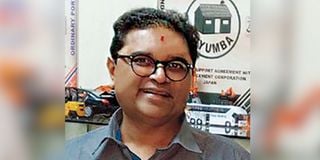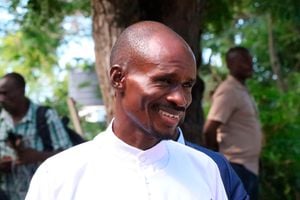
Mombasa Cement proprietor Hasmukh Patel.
In a country where billionaires often revel in the media spotlight, industrialist and philanthropist Hasmukh Patel, best known for Mombasa Cement, was almost a mythical figure.
Despite being a titan of industry and philanthropy, the billionaire who died on Thursday after a sudden illness, remained media-shy — rarely photographed and almost never granting interviews.
Mr Patel's presence was felt more in his quiet, generous and charitable deeds in the Coastal counties of Mombasa, Kilifi, Kwale, Lamu and Tana River than in any public appearances.
While most people knew his name, few can claim to have seen his face, and even fewer have heard him speak.
Last year, I had a chance encounter with the reclusive billionaire at his Mombasa Cement Company factory offices in Miritini.
As the Coast Regional Editor, I accompanied then Nation Media Group Chief Executive officer Stephen Gitagama to express gratitude for a generous advertisement supplement that had ran in our newspaper, the Daily Nation.
Walking into the towering cement plant, the hum of machinery was a reminder of the scale and strength of the operation.
We were greeted warmly by the company’s staff who escorted us through the plant explaining the intricacies of cement production and the company’s plans for future expansion.
It was all very impressive, but I was distracted by an intriguing piece of information whispered among the staff: the presence of the company’s owner, Patel.
This man, I had heard when I was transferred to Mombasa from Nyeri Bureau, was something of an enigma.
He was rarely seen in public or in the media and was more famous for his acts of kindness than his business acumen.
Every day, Mombasa Cement provided free meals to the needy in Kibarani area and Mombasa City CBD Railways area.
He also covered school fees, hospital bills, and even mortuary expenses for those who could not afford them.
Patel's company also sponsored Sahajanand Special School, quietly making a profound impact on countless lives of children born or impacted by different forms of physical and mental disabilities.
I had always imagined a philanthropist of his stature to be a figure paraded across the media, yet this man shunned the limelight.
As we were led to his simple office for a formal meeting, I couldn't help but feel a mixture of anticipation and curiosity.
And there he was.
A modest man with a warm smile and a surprisingly gentle handshake, a man who had inherited and built an empire yet chose to live humbly.
He was dressed in an oversize shirt and invited us to sit down.
His office was a fascinating blend of business acumen and spiritual reverence.
There were stacks of neatly organised files lining the walls, each labelled meticulously with the details of various business operations and charitable projects.
Some are thick with papers, indicating ongoing or long-term commitments, while others are thinner, perhaps representing newer or completed endeavours.
Bills and invoices were arranged in separate trays, he told us.
There were also Hindu statues and sculptures thoughtfully placed throughout the office, which, while functional and efficient, radiated a unique warmth.
That meeting was supposed to be a routine thank-you visit, but it soon took on a different tone.
The conversation flowed from business to life, and soon, I found myself asking the question that had been on my mind since I heard about him.
Why does he do all this for others without seeking recognition?
He smiled thoughtfully before replying.
“When you have been on the other side, you never forget how bad things can get. I don’t do what I do for praise or attention. I do it because I can, and because I must. It pains to see humans who are unable to afford meals yet I can buy them food,” he answered simply.
His words were simple but powerful.
Here was a man who had not only built a successful business from the ground up but had never forgotten his humble beginnings.
"My philanthropy isn’t about media coverage or building a public image. It is a personal mission, driven by empathy and a deep-seated desire to give back," he told the Nation team that also included veteran Mombasa based photo journalist Karim Rajan.
The rest of the conversation continued in a similar vein, with him sharing stories of people he had helped and the joy it brought him.
He also spoke with a quiet passion about the children’s home, where he often visited personally ensuring the kids received the best care and education.
For him, Patel said, success was not just about profit margins or expansion but about making a difference in the community.
As we wrapped up our visit, I couldn’t help but feel a deep respect for this man who had chosen to remain in the shadows, letting his actions speak louder than words.
The encounter was a humbling reminder that there are still people who believe in doing well without the need for applause or accolades.
Walking out of Mombasa Cement Company that day, I realised I had gained more than just a visit.
I had been given a glimpse into the life of a man who had found his own unique way to change the world, one act of kindness at a time.
It was a perspective I would carry with me long after the echoes of machinery had faded and the cement dust had settled.
Omshanti Omshanti Omshanti








